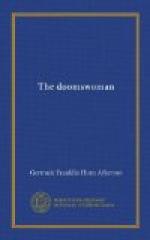Chonita, clad in a black gown, walked slowly up and down the corridor of Casa Grande. The rain should have dripped from the eaves, beaten with heavy monotony upon the hard clay of the court-yard, to accompany her mood, but it did not. The sky was blue without fleck of cloud, the sun like the open mouth of a furnace of boiling gold, the air as warm and sweet and drowsy as if it never had come in shock with human care. Prudencia sat on the green bench, drawing threads in a fine linen smock, her small face rosy with contentment.
“Why dost thou wear that black gown this beautiful morning?” she demanded, suddenly. “And why dost thou walk when thou canst sit down?”
“I had a dream last night. Dost thou believe in dreams?” She had as much regard for her cousin’s opinion as for the twittering of a bird, but she felt the necessity of speech at times, and at least this child never remembered what she said.
“Sure, my Chonita. Did not I dream that the good captain would bring pink silk stockings? and are they not my own this minute?” And she thrust a diminutive foot from beneath the hem of her gown, regarding it with admiration. “And did not I dream that Tomaso and Liseta would marry? What was thy dream, my Chonita?”
“I do not know what the first part was; something very sad. All I remember is the roar of the ocean and another roar like the wind through high trees. Then a moment that shook and frightened me, but sweeter than anything I know of, so I cannot define it. Then a swift awful tragedy—I cannot recall the details of that, either. The whole dream was like a black mass of clouds, cut now and again by a scythe of lightning. But then, like a vision within a dream, I seemed to stand there and see myself, clad in a black gown, walking up and down this corridor, or one like it, up and down, up and down, never resting, never daring to rest, lest I hear the ceaseless clatter of a lonely fugitive’s horse. When I awoke I was as cold as if I had received the first shock of the surf. I cannot say why I put on this black gown to-day. I make no haste to feel as I did when I wore it in that dream,—the desolation,—the endlessness; but I did.”
“That was a strange dream, my Chonita,” said Prudencia, threading her needle. “Thou must have eaten too many dulces for supper: didst thou?”
“No,” said Chonita, shortly, “I did not.”
She continued her aimless walk, wondering at her depression of spirits. All her life she had felt a certain mental loneliness, but a healthy body rarely harbors an invalid soul, and she had only to spring on a horse and gallop over the hills to feel as happy as a young animal. Moreover, the world—all the world she knew—was at her feet; nor had she ever known the novelty of an ungratified wish. Once in a while her father arose in an obdurate mood, but she had only to coax, or threaten tears,—never had she been seen to shed one,—or stamp her foot, to bring that doting parent to terms. It is true that she had had her morbid moments, an abrupt impatient desire for something that was not all light and pleasure and gold and adulation; but, being a girl of will and sense, she had turned resolutely from the troublous demands of her deeper soul, regarding them as coals fallen from a mind that burned too hotly at times.




